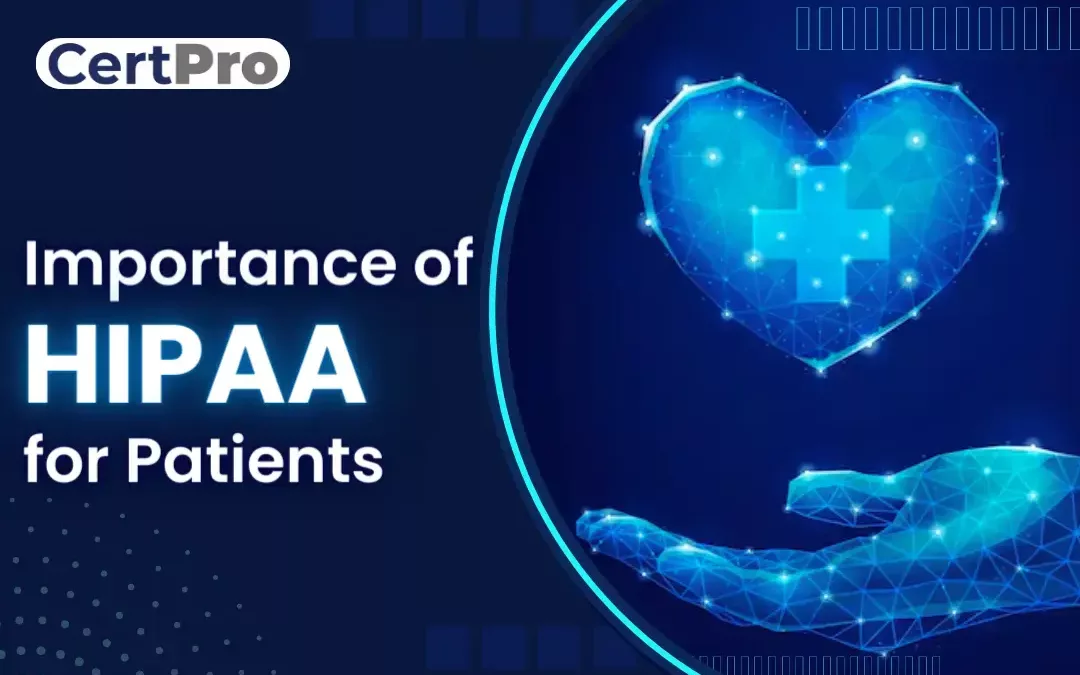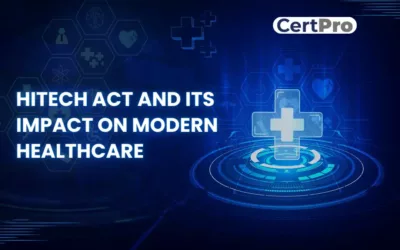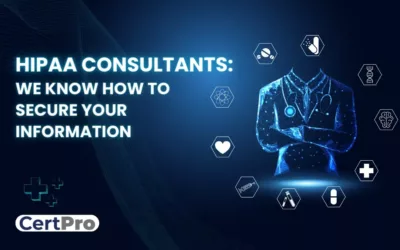The Health Insurance Portability and Accountability Act, also known as HIPAA, is crucial for patients because it safeguards their privacy and health information. In order to provide national standards for the security of specific health information, the US Congress passed HIPAA in 1996. Because it helps to protect patients’ private and sensitive health information, including their medical history, diagnosis, treatments, and prescriptions, HIPAA is crucial for patients. This is crucial for protecting their health information’s privacy and confidentiality and avoiding illegal access to, use of, or exposure of it.
By mandating healthcare providers, health plans, and other covered organizations to safeguard the privacy, accuracy, and accessibility of patient health information, the legislation offers people control over their data. Additionally, it gives patients the right to see and get copies of their health information, as well as the ability to ask for changes if required. In this article, we will learn about Importance of HIPAA, its features, and how it is helpful for patients
What is HIPAA?
HIPAA was created to preserve the privacy, accuracy, and accessibility of people’s personal health information, as well as to provide them with certain rights about such information. Health plans, healthcare clearinghouses, and healthcare providers who transfer medical data electronically are also subject to the regulation.
The Privacy Rule and the Security Rule are the two primary HIPAA regulations that control the security and privacy of health information. While the Security Rule establishes criteria for securing electronic protected health information (ePHI), the Privacy Rule establishes national standards for preserving the privacy of certain personally identifiable health information.
In accordance with HIPAA’s breach notification requirements, covered companies must notify those impacted in the event that their unprotected health information is compromised. HIPAA also has procedures for upholding legal compliance, including civil and criminal fines for infractions.
How can HIPAA be helpful to industries?
Industries may benefit from HIPAA, or the Health Insurance Portability and Accountability Act, in a variety of ways. Here are a few instances:

1. Healthcare sector: HIPAA rules include standards and recommendations for protecting patient information, including electronic protected health information (ePHI). This aids healthcare institutions in safeguarding the confidentiality and security of patient health information, which may make patients feel more trusted and lead to higher standards of treatment.
2. Insurance sector: Health insurance plans are subject to HIPAA laws as well and are required to uphold the security and privacy requirements for patient data. When health plans and healthcare providers exchange patient health information, this helps to assure its security.
3. Technology sector: HIPAA’s ePHI security guidelines can serve as a guide for the development of technologies and systems for storing and transmitting health information. This might assist in strengthening the security of medical data and guarding against hacks and illegal access.
4. Business partners: HIPAA mandates that healthcare organizations enter into agreements with any business partners who handle the health information of their patients, such as billing firms or IT service providers. This makes it possible to guarantee that business partners are likewise held accountable for maintaining the confidentiality and security of medical data.
Why is HIPAA important to patients, and how is it helpful?
A number of HIPAA’s features are advantageous to patients, medical professionals, and health insurance. The Privacy Rule, which establishes national standards for the protection of PHI, is one of the most significant components. The covered entities, which include healthcare providers, health plans, and healthcare clearinghouses, are subject to the Privacy Rule. Covered organizations must put in place administrative, physical, and technological safeguards to protect the confidentiality, availability, and integrity of PHI. These security measures assist in limiting unauthorized access to, use of, and disclosure of PHI.
Patients’ rights toward their medical information: HIPAA is significant from the patients’ point of view since it mandates that all covered organizations safeguard and maintain the privacy and confidentiality of all patient information. Patients have a wide range of rights under the HIPAA Privacy Rule, which covered businesses are required to uphold in order to achieve the framework standards. The four main facets of HIPAA—which are crucial for patients—are listed below.
Right to make corrections: Patients also have a number of rights under HIPAA regarding their PHI. Patients, for instance, are entitled to view their own health data, such as billing data, test results, and medical records. Patients have the right to seek the transmission of their health information to another healthcare provider or health plan, as well as the correction of any inaccuracies or omissions in their PHI. Patients also have the ability to request that specific people or organizations, such as family members or employers, not get access to their PHI.
Right to access PHI: Patients have the right to access their own personal health information (PHI), which includes their medical records, test findings, and billing data. Patients have the right to seek the transmission of their health information to another healthcare provider or health plan, as well as the correction of any inaccuracies or omissions in their PHI.
The right to get a notice of privacy practices: Patients have the right to obtain a notice of privacy practices from covered organizations, such as healthcare providers and health plans, outlining how their PHI will be used and shared as well as their rights with regard to their PHI.
The option to ask for limitations on how PHI is used and disclosed: Patients have the right to seek limitations on the use and sharing of their PHI. For example, they might ask that information not be disclosed to family members or employers. While covered companies are not compelled to accept these requests, they are expected to give them some thought and an answer.
Having the right to be informed about privacy practices: One of the patient rights outlined by the Health Insurance Portability and Accountability Act (HIPAA) is the right to obtain a notice of privacy practices. Patients must receive a written notice from covered organizations, such as healthcare providers and health plans, outlining how their protected health information (PHI) will be used and released. The patient’s rights regarding their PHI are also described in this notification, including the ability to view such information, ask for changes, and lodge grievances. Patients have the right to seek and receive this notification during their initial contact with a covered organization.
The right to seek confidential communications: Patients have the option to choose how they would like to receive their health information, for example, via email or through a specific address. Covered companies must grant all reasonable requests for confidential communications.
The ability to complain: Patients who think their PHI has been misused or exposed may do so by contacting the HHS Office for Civil Rights (OCR). After looking into complaints, the OCR upholds HIPAA privacy and security regulations.
The right to notification in the case of a PHI breach: Another crucial patient right under HIPAA is the right to notice in the event of a PHI breach. In the event that their protected health information (PHI) is compromised, covered entities are required to alert the patients. The notice must contain information about the breach, the kind of PHI implicated, the actions the covered organization is taking to investigate the breach and lessen any impact, and patient safety precautions that should be taken in the event of a breach.
These patient rights are important because they give patients control over their medical information and help protect the privacy and security of their PHI. By calling their healthcare provider or health plan and asking for the relevant documents or information, patients can exercise their HIPAA rights. Under HIPAA, covered entities are required to abide by these demands; otherwise, they risk civil or criminal penalties.
Additionally, HIPAA mandates that covered organizations put in place administrative, physical, and technological security measures to protect the privacy, availability, and integrity of PHI. To reduce any threats to the privacy, security, or accessibility of PHI, covered organizations must undertake risk analyses and put in place proper risk management plans. Additionally, they must offer continuing monitoring and oversight of their compliance with the HIPAA privacy and security laws, as well as training for their staff members on these regulations.
How to protect yourself from breaking HIPAA rules?
To avoid infringing HIPAA regulations, it’s crucial to comprehend and adhere to them, whether you work in a hospital environment or for any other covered organization that manages protected health information (PHI). To protect yourself from violating HIPAA regulations, follow this advice:
- Get HIPAA training, and make sure you get the right HIPAA training, which should include the rules and norms. This will assist you in comprehending the regulations, the potential repercussions of breaching them, and how to follow them
- Adhere to the “minimum necessary” approach and only access or disclose PHI that is required for the performance of your job duties. Refrain from accessing or sharing PHI if it is not necessary for healthcare activities such as payment or treatment.
- Take reasonable precautions to protect PHI from unauthorized access, use, and disclosure at all times. This could entail password-protecting data and computers, locking filing cabinets, and safely discarding PHI.
- Use secure communication channels to share PHI. Use secure communication channels like encrypted email or secure messaging services. Refrain from talking about PHI in public or leaving PHI-containing messages on voicemail or answering machines.
- Before releasing someone’s PHI for reasons other than treatment, payment, or healthcare operations, get that person’s written consent. Patients must be made aware of the reason for the disclosure and the recipients of their PHI.
- Reporting breaches, Inform your supervisor or the authorized privacy officer right away if you suspect or learn of a PHI breach. Delays in disclosing a breach may cause more harm to patients and subject the covered business to harsher sanctions.
- To guarantee compliance with HIPAA rules, HIPAA policies and procedures should be reviewed on a regular basis. This involves conducting recurring risk analyses to find possible threats to the privacy, security, and accessibility of PHI.
Through thorough HIPAA compliance assessments, remediation programs, on-site audits, and continuing assistance, CertPro assists industries in achieving HIPAA compliance and certification. For the purpose of locating holes and weaknesses in the sector’s HIPAA compliance program, CertPro assesses policies and procedures, security controls, risk management, and training programs.
CertPro offers a remediation plan and aids in its implementation based on the evaluation. Additionally, CertPro performs on-site audits to verify adherence to HIPAA standards and offers continuous support, such as recurring audits, training, and help with regulatory changes. Industries may get HIPAA certified, avoid potential HIPAA breaches and fines, and protect patient privacy by collaborating with CertPro.
FAQ
How does HIPAA provide security?
The HIPAA Security Rule requires doctors to use suitable administrative, physical, and technical protections to maintain the confidentiality, integrity, and security of patients’ electronically stored, protected health information (also known as “ePHI”).
Who oversees HIPAA?
Enforcing the Privacy and Security Rules is the responsibility of the Office for Civil Rights at HHS. For the majority of HIPAA-covered businesses, enforcement of the Privacy Rule started on April 14, 2003.
What is included in the PHI?
PHI is any type of health information, including spoken, written, or electronic records. PHI therefore includes medical bills, lab test results, medical records, and health histories. Basically, any health information that has personal identifiers is regarded as PHI.
What are the three security areas that HIPAA mandates?
Administrative, physical, and technical precautions are required under the HIPAA Security Rule.
Why is knowledge about health so crucial?
Information about health is crucial since it may save lives. It can also result in identity theft, security breaches, and other problems when stolen. One such example is the sale of stolen medical information on the dark web for over $1,000, according to credit reporting company Experian. While Social Security numbers might be purchased for as little as $1 each, credit card numbers typically sell for roughly $5 each.

About the Author
SHREYAS SHASTHA DRUPADHA
Shreyas Shastha Drupadha, a Senior Business Consultant. Serving as an ISO 27001 Lead Auditor, Shreyas ensures the establishment of robust information security management systems. His expertise also encompasses GDPR, HIPAA, CCPA, and PIPEDA implementation.
HITECH ACT AND ITS IMPACT ON MODERN HEALTHCARE
In 2009, the Health Information Technology for Economic and Clinical Health or HITECH Act was signed to transform the American healthcare industry. The laws worked as a forward-thinking process of changing patient services. In this regard, the Patient Protection and...
BEST PRACTICES FOR DATA PROTECTION IN THE HEALTHCARE INDUSTRIES
In the healthcare sector, safeguarding sensitive information about patients is extremely important. Patient data includes personal details, medical histories, and treatment plans. Therefore, it must be protected and should be confidential. Thus, breaches not only...
HIPAA CONSULTANTS: WE KNOW HOW TO SECURE YOUR INFORMATION
Navigating HIPAA compliance can be complex; therefore, organizations seek advice from HIPAA consultants. These HIPAA experts have specific knowledge. They can help firms to understand the problematic standards of the Healthcare Privacy Act. In 1996, HIPAA was created....




